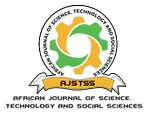Pathogen inactivation from faecal waste via black soldier fly treatment
DOI:
https://doi.org/10.58506/ajstss.v2i2.212Keywords:
Onsite,, Bioconversion, Coliforms, Feacal, Container Based Sanitation, E.Coli InactivationAbstract
Sustainable development goal 6.2 advocates for increasing access to equitable and adequate hygiene and sanitation for all by 2030, and its indicator target is to raise the proportion of the population using safely managed sanitation. On the contrary, it is approximated that only 54% of people globally have access to safely managed sanitation, while 2.4 billion lack access. Recent innovations have however seen the development of low-cost technologies that can be customized depending on the region. The container based sanitation (CBS) is one of the options for safely managing the waste compared to conventional sewerage systems that are expensive. However, the need for emptying and transportation of filled fecal sludge (FS) containers on daily basis, leads to high operational costs and increases the operational exposures risks to fecal pathogens amongst the CBS operators. The study determined the performance efficiency of Black Soldier Fly Larvae in inactivation of E.coli via seeded container based sanitation- Urine diverting dry toilet model. Sample was transported to the lab for analysis of E.coli after every 3 days from Seeded households and samples from Non seeded households in replication. One gram of sample was used in serial dilution up to factor 5.The inoculum was plated in Tryptone Bile Glucuronic (TBX) agar for enumeration according to manufacturer’s instructions. Plates with 30-300 colonies were considered viable for counting. The study used statistical analysis IBM SPSS software from the sets of experiments. The E.coli (CFU/ml) mean varied between 7.3±1.3 and 10.1±2.8 for Seeded treatments while non-seed treatments ranged between 7.5±1.6 and 10.4±3.2. A significant variation occurred between the two treatments at p<0.05(SH and NH). Findings from this study showed that there was reduction of E.coli coliforms with Bioconversion of organic waste using the BSF technology has been noted to reduce the E.coli load and reducing the volume of the bio-waste. Sanitation policy makers can apply the findings of this study in formulation of policies on safe handling and disposal of fecal matter from onsite sanitation facilities.


